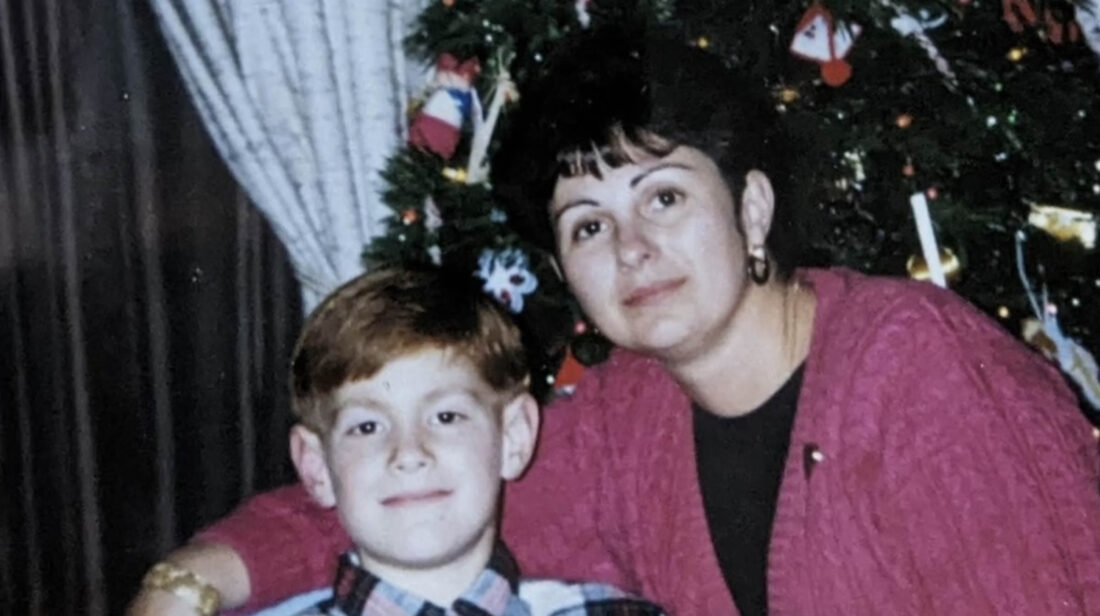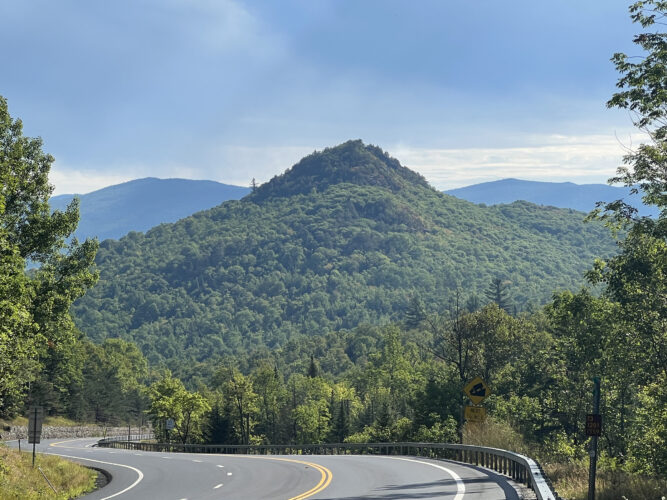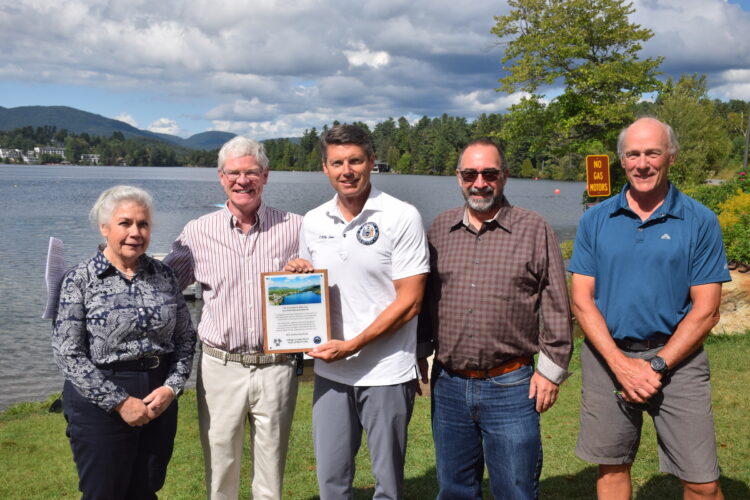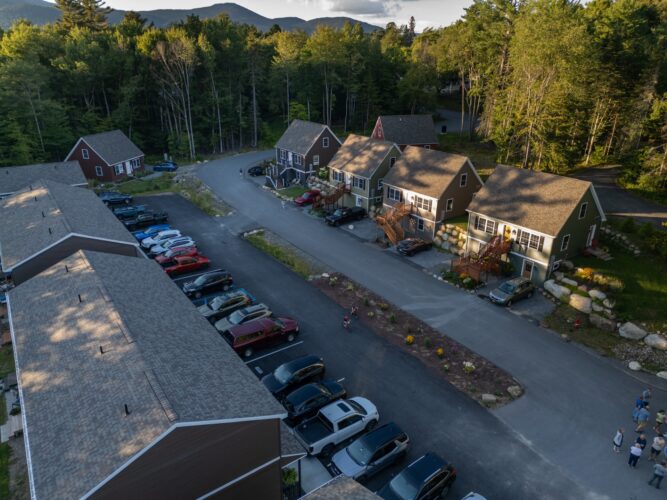Son reacts to Glanda murder doc
Crime took place 26 years ago in Lake Placid

Tyler and Jeannine Glanda are seen here in a family photo included in a new episode of Investigation Discovery’s “American Monsters." (Photo provided )
LAKE PLACID — On Father’s Day this year, Tyler Glanda remembers standing in his kitchen and watching an episode of “American Monster,” a true crime documentary series. On the screen was his father.
“American Monster” recently released an episode about Jeffrey Glanda — a man Tyler compares to Jekyll and Hyde or Jeffrey Dahmer — and his mother, a woman who taught him the best attributes he sees in himself today.
It was an emotional task for Tyler to watch the episode and relive the story of how his mother, Jeannine, was murdered by her estranged husband Jeffrey in August 1997 in her Lake Placid home.
Tyler was 12 when both his parents were taken from him, a trauma he’s still grappling with to this day. But as he watched home video footage of his mother at family parties used in the episode — tapes he hasn’t seen in a quarter-century — he heard himself delivering messages he’s been sharing for just as long about domestic violence, survivor’s guilt and Jeannine’s kindness.
Tyler has done interviews for television documentaries on the murder in the past, including another Investigation Discovery show, “Fatal Vows,” in 2018, but he and his family were unhappy with how that episode was edited and presented. The show came out differently than they had expected. Instead of telling their mother’s story, he felt it sensationalized the crime without discussing her much at all.
It left a foul taste in his mouth. So when the creators of Investigation Discovery’s “American Monster” approached him last October to do an episode on his family, he was adamant: It had to be done right. He watched some of the show’s episodes, and after a lot of discussion with both of his sisters, he felt comfortable and agreed.
Tyler said his family was pleased with this episode. They felt it was a much better portrayal of what happened and who their parents were. It focused more on Jeannine’s character versus sensationalizing what happened to her, he said. This sensationalizing of violence is a concerning trend he sees in the increasingly popular true crime genre of television.
“I feel like in a lot of these documentaries that you see — not (‘American Monster’) but the ones you see on Netflix — they have a tendency to … almost to showcase the killer. … This idea that we highlight the perpetrator for the things that they did and forget about the victim, it’s backwards,” Tyler said. “It sheds light on the wrong side of it. We shouldn’t be looking at somebody like my father or Jeffrey Dahmer. We shouldn’t be looking at them and be captivated by their actions. What we should be looking at is who they took away and what it meant to the people that are left behind.”
He said the “American Monster” episode showed the contrast in who his parents were.
“My father could have fallen off the face of the earth and I don’t think that there would have been too many people that would have even recognized it. My mother being taken from this world shattered a community, shattered multiple communities,” Tyler said.
Jeffrey Glanda died in prison in 2019 at the age of 69 while serving a life sentence without parole for first- and second-degree murder.
Nicholas Pecararo, Jeannine’s former friend, was convicted of second-degree murder as an accomplice. He served 24 years of his 20-to-life term before being released on parole in 2022. Pecararo is now 58.
To read more about the murder, the police investigation and the fallout from these events, go to bit.ly/44qmWgG.
–
Father’s Day
–
The episode was released on Father’s Day. Tyler had not expected this, and he only got two weeks’ warning to prepare himself. It was a tough day for it to drop, but he said it was poignant.
“What better way to show how not to be,” Tyler wrote on Facebook leading up to the release.
His parents set very different examples for him at a young age, and he said comparing their actions has undoubtedly influenced who he is today.
“I’m thankful for everything that I’ve had up to this point. I mean, I wouldn’t wish my childhood on anybody. At the same time I feel like you can’t allow things that happen to you as a child to dictate who you become,” Tyler said. “I focus every day on trying to provide my kids with the life that was taken away from me.”
He’s also trying to give them the good parts of the life he had.
“In a way it’s fulfilling the childhood that I lost, too,” Tyler said.
His kids, 8 and 14, are around the same ages he and his sister Jordan were when they lost their parents.
His son is old enough now to discuss the traumatic events of his childhood with. His daughter is not. He said this is not a burden she needs to think about yet.
“When that time comes, we’ll have that conversation. But until then … there’s no sense in taking any light out of her life,” Tyler said.
Tyler had a full house on Father’s Day. His son had friends over the night before, and they stayed up late making spaghetti. His daughter had a friend over, and they were all up at 7 a.m. building LEGO sets, building necklaces and disassembling a motorbike. He was making pancakes for the whole lot.
“It was nothing spectacular, but it was all the little things … nothing else really matters when they’re here,” Tyler said.
When the kids left the house that afternoon he began gearing himself up to watch the episode. He watched the whole thing pacing back and forth by himself in his kitchen.
“I basically wore a path in my kitchen area,” Tyler said.
He was so anxious about the edit. Scheduled for three hours in the interview chair, he had been there for five.
“Oh, it’s nerve-wracking,” he said.
The producers took “the best parts” and condensed them down to a portion of a 40-minute episode.
Tyler said people are telling him how composed he appears in the clips, but he was taking deep breaths between each word to not break down.
Eventually, he said he broke down in the last hour of the interview, but most of that was not aired.
“It’s not an easy thing to discuss,” Tyler said.
While he has spent years talking about his childhood with people, when telling it to such a wide audience, he knew he needed to do justice for himself, and his mother.
“On a regular basis I can talk about this to anybody,” Tyler said. “But when it comes to this, this means something to me.”
He wanted to share a message for people who have faced domestic violence or are currently in situations like that.
“These situations don’t typically change,” Tyler said. “And it’s not something that happens overnight.”
Jeannine and Jeffrey Glanda, both Lake Placid residents at the time, had been separated for four years when he murdered her.
Tyler’s aunt, Kari Ratliff, also agreed to be part of the documentary.
“Our sole purpose of doing another show about this tragedy is to spread awareness about domestic violence, narcissism and the warning signs,” Ratliff wrote on Facebook before the episode aired. “If someone watching recognizes their own situation or that of a loved one, we hope this show can help save a family from enduring what our family experienced.”
–
Magnetic feelings
–
Tyler had a stack of home videos on VHS tapes that he hasn’t been able to watch in more than 25 years.
“Who owns a VCR at this point?” he asked.
He sent them to the producers and they sent him back digitized versions on a hard drive. Watching them was a mixed bag of emotions.
“On one hand, it was tears of joy because I’m hearing my mother’s voice for the first time in 25 years,” Tyler said. “And then there’s also the guilt of feeling like I should have been able to do more for her.”
This guilt is something he’s grappled with in therapy through the majority of his life.
“I had no control, but I felt like I should have,” Tyler said. “Even at the age of 12, I felt like I should have been able to protect her and I feel guilty for not being able to do so.”
He had learned about Jeffrey stalking Jeannine and wiretapping her phone, and though he told her about this two weeks before the murder, he feels like he waited too long and feels responsible for her not getting away when she could.
He reruns those weeks in his dreams.
“I’ve had several nightmares that are so vivid of me stopping the events that occurred, but I’m older. I’m 18. I’m 22. I’m 24. And I’m able to stop the two of them,” Tyler said. Through therapy and dream interpretation he’s found the message of these dreams to be “I wasn’t ready.”
“There was nothing you could do,” people tell him. He hears that a lot. “You can’t blame yourself.”
But thinking that doesn’t change the feeling. Tyler said guilty feelings are not discarded easily. For him, it’s about coming to terms with that feeling, not changing it.
–
Evolving
–
Tyler is still learning about his past.
Several of the prosecutors who worked on the murder case were featured in the episode, as well as Lake Placid Police Officer Michael St. Louis, the officer whose cruiser Jeffrey crashed into the morning he was arrested in September 1997 at the corner of state Route 86 and Old Military Road.
Tyler said hearing things from their perspectives, especially from St. Louis, and hearing what their intent was at the moment brought a whole new level of respect for the people who were around him at the time.
“It really opened my eyes to things I hadn’t really had any privilege of knowing prior,” Tyler said. “It allowed me to kind of be at peace with some of the things that I’ve been dealing with for the last 26 years.”
At the time, he was wary of the officers who were trying to keep him and his sister safe. He was 12, and his sister was 8. They were confused and not OK with what was going on. They had just lost their mother a month ago. Now, they were hearing their father had been in a high-speed chase, might die from his injuries and has been arrested.
At the time they wondered, “Why is everybody picking on our family?”
Tyler said it was hard to see the whole picture when he was so close to it. Over the years, he has stepped back and looked at the whole scene.
Through this understanding, he said his own life has blossomed. He now takes the time to speak at domestic violence events and help other people.
After the “Fatal Vows” episode aired, Tyler heard a lot of negative comments. People asked him how he can care about his father after what he did.
“We don’t have a choice,” Tyler said. “That was the only father we ever knew. … It’s not like we’re going to have anybody that ever steps up and replaces that.”
He said his father’s “Jekyll and Hyde” mindset was confusing as a child. He didn’t have the vocabulary to understand narcissism yet.
“One minute he’s got this big smile on his face and he’s trying to get all the attention in the room. And the next minute it’s like there’s nobody there,” Tyler said. “You’re staring into a void.”
Along with the memories of despair, he said he has very happy memories of childhood. He’ll never know how genuine Jeffrey’s motives were for the nice things he did, but still they have positive memories with him and they try to hold on to the good times.
Tyler can’t control that Jeffrey was his father, he can’t control what Jeffrey did, but he can control how he reacts.
Though he feels disdain toward his father for taking away everything they had away senselessly, he maintained contact with Jeffrey in prison for years. Tyler said maintaining contact may have been selfish, but he was trying to understand his past. He wanted to know more about his parents, directly from the source.
“You can’t truly evolve until you know where you came from,” Tyler said.
And he feels he has evolved.
“I feel like I’ve gone from a very bitter person … now I’m content with who I am,” he said.
His only concerns are how his children view him. And he lets them know they’re the priority.
Seeing home video from his cousin’s birthday in the episode was especially hard. It was taken two weeks before Jeannine was killed. It already would have been a challenging time in his life. Tyler was being lied to by Jeffrey and being manipulated to distrust and hate her. He and his mother had a rocky relationship and they had just recently reconciled.
But that video of Jeannine was how he remembered her. She was relaxed and enjoying herself, happy to be with family. She was present and not lingering on the things that were bothering her.
Tyler said he gets his ability to hide his pain from his mother, and he loves making people smile, like his mother did.
“I guess when you’ve seen the darkest that life has to offer, you don’t want anybody else to go through that,” Tyler said.
This can be small things, like sharing a funny Facebook post, making a self-deprecating joke or being goofy with his kids. If that gets people through the day or shakes them out of a funk, then he’s done what he wants.
Tyler said he is not too good to make a fool of himself for someone else’s benefit, unlike his father, because he believes when his intentions are good, it doesn’t matter how he looks.
The most common response to the episode Tyler has heard in recent weeks is “God, you look just like your mother.” That, to him, this is the highest compliment he could get.




